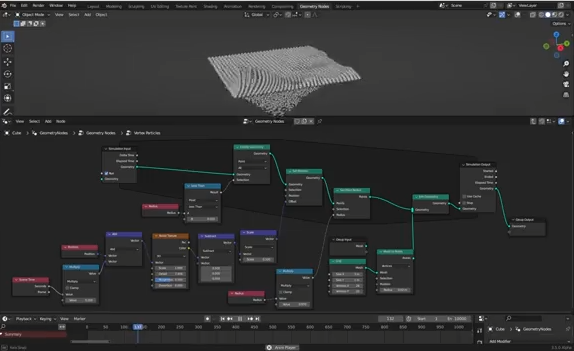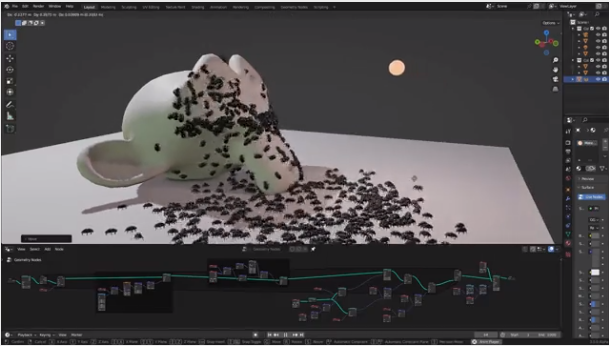Blender’s new node-based simulation framework

Blender’s long-awaited node-based simulation framework is now publicly available via a new experimental branch of the open-source 3D software.
The framework – an expansion of the existing Geometry Nodes system to support particle-based simulation – is currently scheduled to be merged into the main branch in Blender 3.5 next year.
Part of the ongoing Everything Nodes development project
First proposed in 2019, Everything Nodes is one of the most eagerly anticipated changes to Blender.
The development project proposes a new node-based architecture that makes it possible to create new tools and procedural content by wiring nodes together, in much the same way as is possible in Houdini.
Its first public showing was in the Geometry Nodes system introduced in Blender 2.92 last year, and updated steadily in subsequent releases.
While Geometry Nodes open up new workflows for modelling and scattering, the design goals are much wider, and include a node-based particle system – and, ultimately, a new unified simulation framework.
‘Basic simulation support’ now available in Geometry Nodes in experimental builds of Blender
Those goals came a step closer, with developer Jacques Lucke announcing on Twitter that the Geometry Nodes team are now working on “basic simulation support”.

The implementation is described as having “many limitations”, and indeed, the initial demo video (embedded at the top of the story) is pretty bare-bones, showing a low-density array of particles that looks more suited to motion graphics work than creating any kind of detailed physics simulation.
However, the system is already capable enough for users to to start building flocking simulations, like the one above, created by add-on developer Shahzod Boyhonov – and even a procedural animation set-up.
Release dates and system requirements
Simulation nodes are currently available via an official experimental branch of Blender. It is compatible with Windows, Linux and macOS, but you have to compile the software from source.
The functionality is due to be merged into the main branch of Blender in Blender 3.5, currently scheduled for release in March 2023.
The current stable release, Blender 3.3, is available for Windows 8.1+, macOS 10.13+ and Linux.

熱門頭條新聞
- Pokémon TCG Collects Some New Tricks
- 48 hours: 10. Global Game Jam @ InnoGames
- Puella Magi Madoka Magica Magia Exedra
- SelectaPlay and Newcore Game Reveal The Devil Within: Satgat Collector’s Edition for PlayStation 5
- 10 Reasons Filmmakers Can Thrive in 2025
- The CNC at the 75th edition of the Berlinale and the European Film Market
- The 2025 Kidscreen Award winners
- Vibrant Action Roguelite Yasha: Legends of the Demon Blade Releases April 24,2025
